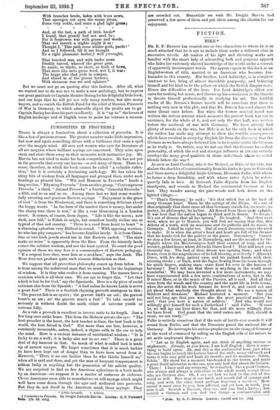CURIOSITIES IN PROVERBS.$ THERE is always a fascination about a
collection of proverbs. It is like a box of precious stones. The greater number make little impression, but now and again something shines with a brilliance that casts a spell over the magpie mind. All men and women who care for literature at all are magpies where brilliant sayings are concerned. They seize upon them and store them away in their memories with instinctive joy. Mr. Marvin has not tried to make his book comprehensive. He has not put in the proverbs that every one knows—or not many of them. There is a sense, therefore, in which his book cannot be called " a valuable collec- tion," but it is certainly a fascinating anthology. He has taken his shiny bits of wisdom from all languages and grouped them under such headings as pleased him. " Wit and Humour in Proverbs " heads a long section, " Rhyming Proverbs " form another group, " Contemptuous Proverbs " a third, " Animal Proverbs " a fourth, " Graceful Proverbs " a fifth, and so on and on on. Among these last we find some wonder- fully arresting and gracious Eastern sayings. " Enjoyment is the grace of God" is from the Hindustani, and there is something delicious about the happy words. " In the hum of the market there is money, but under the cherry-tree there is rest," is like a rose blossoming in a London street. It comes, of course, from Japan. " Life is like the moon; now dark, now full," is Polish in origin, but somehow hardly strikes one as typical of that sad country. " There is a road from heart to heart " is a charming aphorism very Biblical in sound. " With opposing warriors, he who has pity conquers," has become familiar lately. It is from China. One or two Irish jewels stand out in this Eastern casket. "The stars make no noise " is apparently from the Erse. From the leisurely lands comes the subtlest wisdom, and not the least cynical. To court the good opinion of those we may fear is a commonplace of Eastern pedagogy. " If a serpent love thee, wear him as a necklace," says the Arab. The West does not produce quite such sinuous didacticism as that.
We suppose that all proverbial philosophy comes up from below. It is from among the unlettered mass that we must look for the beginnings of wisdom. It is they who evolve it from cunning. The masses have a cynicism which is all their own. We are apt to forget this. " Let that which is lost be for God," say the Spaniards. Here is a sly piece of social criticism also from the Spanish : " A fool unless he knows Latin is never a great fool." There is a Scottish rhyming proverb analogous to this : " The gravest fish is an oyster ; the gravest bird's an ool ; the gravest beast's an ass ; an' the gravest man's a fool." To take oneself too seriously is without doubt the mark either of extreme youth or extreme folly.
• As a rule a proverb is excellent in inverse ratio to its length. Just a few long ones strike home. This from the Hebrew arrests the eye: " The best preacher is the heart, the best teacher is time, the beat book is the world, the best friend is God." Not more than one line, however, is commonly memorable, unless, indeed, a rhyme calls in the ear to help the mind. Here is a curious instance of antithetical wisdom : " It is lucky to see a wolf; it is lucky also not to see one." There is a great deal of dry humour in that. So much of what is called luck is made up of narrow escapes. We forget sometimes that it is much luckier to have been kept out of danger than to have been saved from it. , However, " There is no one luckier than he who thinks himself so," when all is said and done, and yet the man of buoyant temperament is seldom lucky in anything but the possession of his salient quality. 'We are surprised to find so few American aphorisms in a book made by an American—we suppose it is a matter of embarras de riehessea. Clever Americans seem able to manufacture at will sayings which might Well have come down through the ages and mellowed into proverbs. But they do not dwell in the American mind, these sayings. They
* Little breadth. i Arbour.
Curiosities in Proverbs. By Dwight Edwards Marvin. London G. P. Putnam's Vow. Us. 4d. nct.,1 are crowded out. Meanwhile we wish Mr. Dwight Marvin had preserved a few more of them and put them among the classics for our enjoyment.


































 Previous page
Previous page